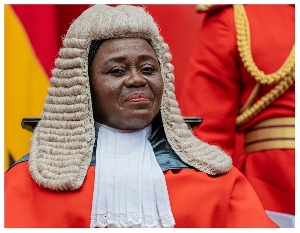A Ghanaian citizen, Ebenezer Osei-Owusu, has taken legal action against President John Dramani Mahama and the Council of State to halt the process of removing Chief Justice Gertrude Araba Esaaba Sackey Torkornoo from office, as outlined in Article 146(6) of the Constitution.
The action, filed at the Supreme Court on March 27, 2025, comes after the presidency revealed that it had received three separate petitions calling for the Chief Justice’s removal.
A letter from the Spokesperson of the government, Felix Kwakye Ofosu, dated March 25, stated that President Mahama had forwarded these petitions to the Council of State for advice and potential further action.
In his lawsuit, the plaintiff, Osei-Owusu, argues that the President overstepped his constitutional authority by forwarding the petitions without first determining a prima facie case against the Chief Justice and providing her with copies of the petitions.
He asserts:
“A declaration that, upon a true and proper interpretation of Articles 146(1), (2), (6), and (8) of the 1992 Constitution of the Republic of Ghana, and in light of the Supreme Court’s decision in the case of Agyei-Twum v. Attorney General & Akwetey [2005-2006] SCGLR 732 (Writ No. J1/7/2006) dated 12th July 2006, the President of the Republic of Ghana, acting in consultation with the Council of State, cannot appoint a committee to inquire into or make a recommendation on a petition for the removal of the Chief Justice without first furnishing the Chief Justice with a copy or copies of the petition(s) seeking her removal and allowing her to comment on them.”
The plaintiff is also seeking:
“An order of the Court setting aside the decision of the President of the Republic of Ghana to consult with the Council of State and the forwarding of three (3) petitions seeking the removal of the Chief Justice, Gertrude Araba Esaaba Sackey Torkornoo, as communicated by the Spokesperson to the President, Felix Kwakye Ofosu, MP, in his release/letter dated Tuesday, March 25, 2025, to the Council of State, on the grounds that it is unconstitutional, null, and void, having been made without first furnishing the Chief Justice with a copy or copies of the petition(s) and affording her the opportunity to comment on them.”



